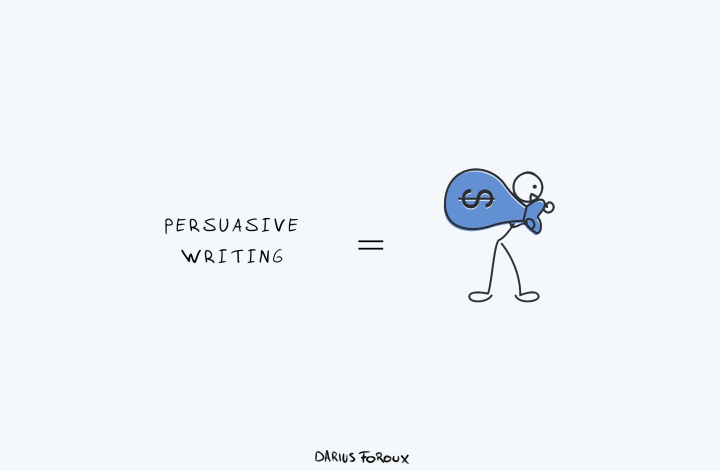“Sell me this pen.” That’s a popular line from the movie, The Wolf of Wall Street, starring Leonardo Dicaprio. The idea is that if you’re a great persuader you can convince any person to buy a pen.
These types of lines sound great in movies or in music, but they reflect real life. We don’t sell anything to anyone because no one likes to be sold.
Persuasive writing recognizes that fact.
And let’s be real, EVERY writer needs to be persuasive. Whether you’re a designer, project manager, nurse, or engineer, you communicate in the written word at work.
When you make your writing persuasive, you will get what you want more easily. We all write for a purpose in our careers. And you want to make sure that your words hit the mark.
That’s what persuasive writing is all about. And here are 3 tips on how to actually persuade people to act using your words.
1. Flip the script
Flipping the script means always recognizing that people don’t like to be sold anything, whether that’s an idea, suggestion, or a product.
Instead, we determine the needs and pain points of our reader. And then we inform them how we can help.
Almost every day, we use our words to persuade people:
- Pitch emails, work emails, presentations, etc. — Most of us send or receive emails for work. To get the best results, try making the other person talk more. Ask probing questions to truly understand what they mean and what they need, from their perspective.
- Website landing pages, sales pages, etc. — For those instances where a Q&A with the audience is not doable, talking to a few people who fit your target audience can be useful. That’s what I do with my courses as well, for example. Whenever I make a landing page, I always consider the feedback from my previous and current students. This helps me to understand the real concerns of my audience.
This applies to in-person conversations as well. We all prefer to trust and buy from people we feel and think truly understand our concerns.
Being a better writer also means becoming a listener. When we listen to what our target readers say, we have a better understanding of how to position our products/services as their best choice.
2. Have something to offer
There was a time when I wanted to try writing fiction. I didn’t have a concrete reason for it. I was just enticed by the idea of me publishing a novel. But I didn’t believe in the story I was writing so it never went anywhere.
For years, I couldn’t understand why I couldn’t write fiction. Then I read an essay by the German philosopher, Arthur Schopenhauer. He wrote:
“There are above all two kinds of writers: those who write for the sake of what they have to say and those who write for the sake of writing. The former have had ideas or experiences which seem to them worth communicating; the latter need money and that is why they write – for money.”
As a writer, there have been online opportunities to write about topics that supposedly bring more money. But if I’m not genuinely interested, I don’t do it. It’s all about the mindset. If you don’t believe in what you’re writing, how can you persuade others to do so?
This is true for all fields. You must believe in what you have to offer.
When we write for the wrong reasons (like making a pitch email purely to make money), our words won’t go far. People want to be informed, to be entertained, to expand their views. That’s something we all can’t get enough of.
When you have something offer, readers won’t even need to be “sold” into buying.
3. Make it easy
When I started blogging, no one knew me online. I didn’t have an existing market, so it was a real challenge to bring traffic to my website. One of the ways I did to bring in more traffic is to pitch guest posts to popular and high-traffic websites where my target readers are, like Fast Company, Inc., and so forth.
I made sure the pitch was very easy to respond to:
- It was short and to the point.
- My pitch was about an article that was a fit with their existing content, but had a unique angle.
- Everything the major magazine needed, like my writer bio, my article data, etc., was attached.
- I also included the full article (not just an idea).
- There was a clear call to action at the end.
All the magazine had to do read the article and decide whether it was a good fit. I made things very easy for the magazine. You can also check the exact template I used (among other templates for other purposes) in my course, Effective Writing.
People have too many things in mind and they receive hundreds of emails and pitches every day. They don’t want to do more work to get something done.
Whether you’re writing an email to ask for time off, or you’re creating a website, always it as easy as possible for your reader to interact with you.
With great persuasion skills comes great rewards
Words are powerful. They can resonate with people, which can inspire action. This is something we hardly ever think about when we write. But the way that others perceive us comes from the words we use.
The beauty is that we write so much and it plays such an important role in our daily lives. When we write more persuasively and effectively, we can instantly get better rewards in our careers.




